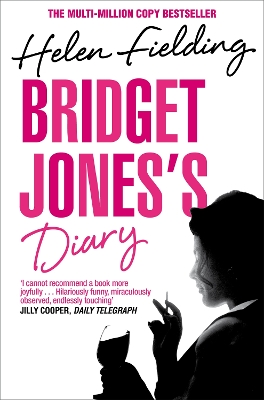Reviewed by Michael @ Knowledge Lost on
First of all, I think of this book as a pseudo feminist novel; while there are plenty of elements in the novel that could be considered a critique of feminism; this is more satire than anything else. Bridget wants to be that kind of woman but she never gets there, she tries to come across as a strong independent working woman who does what she wants when she wants, but when it all comes down to it, what she wants is a man. Interesting enough the strongest feminist is the mother who has legitimate feminist ideals, but not portrayed in a very positive light.
There is this idea that Bridget Jones’s Diary is based on Pride and Prejudice but I have some issues with this and I will try to explore some of my basic thoughts on this. Firstly Bridget is not Elizabeth Bennett; she would like to be, but in the book her personality would be more like Lydia. Her goal is to become more like Lizzie but her relationship with Daniel Cleaver (possible the Wickham of the story) shows us that she is living a life of self gratification. If we are going to compare characters to those in Pride and Prejudice, then Bridget’s mother might start off as a Mrs Bennett but in the end turns into a Lydia as well. Mark Darcy is obviously Mr Darcy and probably the only character that closely resembles the original character. There is also the desire to find a husband (or mate) due to the pressures put on them by their mothers as well as the perception of running out of time. In Lizzie’s case, she was at the age where she needs to seriously consider getting married as it was expected of her and in Bridget’s case it was more to do with her biological clock.
Here is how I think the comparison was made; in the novel Bridget was obsessed with the BBC TV adaptation of Pride and Prejudice, she considered Lizzie and Darcy the idea of the a great romance and wanted to find her own Mr Darcy. She loves the lake scene with Colin Firth in the wet white shirt (not in the book), so when it come to moment where Bridget realises who’s the right man for her, the book tries to replicate the scene with the description of Mark Darcy coming in dirty and sweaty and her attraction to him at that moment. Obviously since the movie had Colin Firth playing Mark Darcy, they were able to replicate this scene a lot better and this is why the ending was changed.
I don’t know much about Chick Lit so it is hard to talk about the writing and how it compares to other books in this genre but I have some thoughts I want to explore. First of all, this novel is almost like a soliloquy; obviously being a diary she is expecting no one else to read her thoughts, so she can express feelings that she would never consider sharing with others. The diary takes the reader through the year with her, as it happens, not with the wisdom of hindsight or any wisdom at all. The only problem is that it blurs the line between a first person narrative and third; there are parts of the book where it would be obscure to think Bridget was writing down everything happening, minute by minute as it was happening. This is to help add to the comedy of the book but to me it added to the absurdity.
Lastly I want to talk about Bridget Jones; the modern woman, obsessed with romance but still wanting to appear as a strong independent woman. She starts the diary in an effort try to improve herself but it also suggests that she is self-absorbed. What really got me was her negative body image; each day she weighed herself and throughout the course of the entire book the most she ever weighed was 9.6 stone (just over 60kg or 132 pounds) and she considers herself overweight by that? I know she compares herself to people on TV but it’s just ridiculous. Also with the amount of calories, cigarettes and alcohol she drinks, I’m surprised she is so under weight and that is where the satire started to frustrate me.
Overall, I was entertained by this book; as a novel it did have its issues and is riddled with chick lit clichés. As a satirical novel, it worked on some levels but most of the time it had to rely on the chick lit elements to help push it through. I didn’t remember much about the movie, except for the fountain scene and Renée Zellweger putting on weight for the role. Which when comparing it to the book doesn’t make sense but on a personal level, I think it was an improvement; she looked fantastic. Overall the book was quirky but the real surprise for me was the wit and irony used throughout the novel; enough to entertain me.
this review originally appeared on my blog; http://literary-exploration.com/2013/04/25/book-review-bridget-joness-diary/
Reading updates
- Started reading
- 22 March, 2013: Finished reading
- 22 March, 2013: Reviewed
